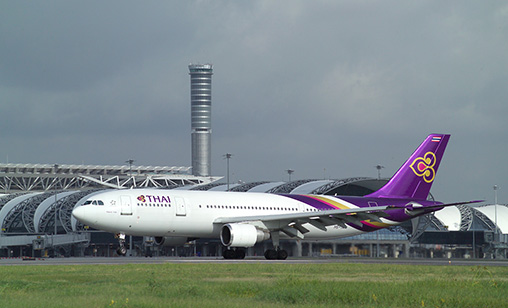News Backgrounder
Thai’s Sumeth faces first leadership test
November 1st 2018
Thai Airways International (THAI) new president, 53-year-old Sumeth Damrongchaitham, received a dictum from Thailand’s Deputy Prime Minister, Somkid Jatusripitak, when he took over at the carrier in September: complete a new rehabilitation plan for the airline within three months. Read More »
It’s a tall order. Last year, the carrier posted a 29.8% drop in operating profit, to $88 million, despite achieving its highest load factor in a decade. But passenger yields fell 7% and when one-off expenses were included for the year, net losses were $63.7 million.
 |
Sumeth told local media the plan aimed to increase revenue from the airline business, catering, and a new MRO facility at U-Tapao airport. THAI’s share of the local market has declined by 10%, to 27%, in the last five years. “The airline business sees relatively stiff competition because of rising numbers of airlines and air routes. The rehab plan needs to increase market share”, Sumeth said.
It also has to make a final decision about an order for 23 new aircraft, both wide and narrow bodies, at an estimated book value of US$3 billion. “I cannot yet reveal any details because the company is in the process of revising the purchase plan. The company’s aircraft purchases need to be revised to conform with its business plan,” Sumeth said.
“The company expects to conclude the purchase plan in 45 days before undergoing vetting by the National Economic and Social Development Board and cabinet approval. The plan to buy new aircraft is a vital part of THAI’s restructuring plan. The purchase is deemed essential to increase the potential of THAI’s airline business,” Sumeth said.
The U-Tapao maintenance centre is a central plank in THAI’s recovery plan. Sumeth said a winning joint venture partner will be secured by next February; a statement that has caused some confusion. THAI signed a Memorandum of Understanding with Airbus in June, but Sumeth said an “auction” was required because Boeing had expressed interest in being involved.
This is a switch in position from June this year when the then acting THAI president, Usanee Sangsingko, said at the MoU signing in Toulouse that “THAI and Airbus have undertaken extensive studies to validate the business plan for this exciting project”.
She continued: “Together, we will develop one of the most advanced and efficient aircraft maintenance centres anywhere in the world.”
Airbus Commercial Aircraft president, Guillaume Faury, said: “We are pleased to enter into this agreement with THAI. This will further strengthen the long-term partnership between our two companies and also contribute to the success of Thailand’s new eastern economic corridor.
“With the fleet of wide-body aircraft in the Asia-Pacific set to triple at around 4,800 airplanes in the next 20 years the project represents a sound business opportunity for both our companies.”
The joint venture is scheduled to be operating within five years. THAI is dismantling the existing U-Tapao MRO facility to provide space for the airport’s second runway and a new passenger terminal.
THAI said the new complex will use “smart hanger” technology that will offer MRO services to five wide-body aircraft and two narrow-bodies and any one time. It will include heavy air-frame maintenance and base maintenance, line maintenance, aircraft painting, other modifications and component maintenance.
Estimated to cost $320 million, it will include a contribution of $192 million from the government, THAI needs to attract joint venture partners to provide the remaining $128 million needed to complete the project.
“The MRO will become significant in generating income to THAI, while the internal rate of return is estimated at 14%, which is quite high,” Sumeth said, and added an estimated income of $6 billion over 50 years from the facility would support THAI’s ambitious to be a national premium airlines.